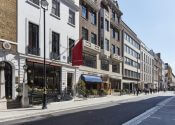Since his childhood, chocolate has always been a major part of Bernard Callebaut’s life.
Born 48 years ago in Weize, Belgium, he grew up across the street from the chocolate factory that had been in his family since 1911.
At the age of six, his family built a house adjoined to the factory wall.
Young Bernard Callebaut could sneak from his bedroom window into the factory throughout many of his early years.
Although the family trade played a major role in his young life, Callebaut never felt any pressure to join the chocolate business.
In fact, he recalls his father saying, “You don’t have to be in the chocolate business if you don’t want to.”
Perhaps it was this unintentional reverse psychology that created the outcome that has since shaped his adult life.
After finishing school, Callebaut carried out a mandatory stint in the Belgian army and then got a degree in electro-mechanical engineering.
His family sold the 69-year-old business in 1980, which is when Callebaut began conducting research into the North American specialty-chocolate industry.
Determining that there was not a great deal of activity in the market, he began taking exploratory trips to North America.
BERNARD CALLEBAUT HAS TAKEN THE WORLD OF FINE CHOCOLATE BY STORM, BUILDING AN EMPIRE THAT IS BRINGING A NEW LEVEL OF INDULGENCE TO CHOCOLATE LOVERS ALL OVER THE WORLD
In 1982, Callebaut decided to move to Calgary.
He appreciated the city’s pro-business atmosphere, dry climate, and long, cool winters.
He also liked its close proximity to the mountains.
After establishing himself in the southern-Alberta city, he opened the world’s first Bernard Callebaut Chocolaterie in 1983.
Throughout the next decade, the business flourished to the point of outgrowing its original quarters.

In 1993, the head office moved into a 52,000 square-foot building, complete with a factory and store just south of Calgary’s downtown core.
“I wanted to have a factory with a retail store, a viewing corridor, and parking.
It has worked out very well,” Callebaut notes.
And what an incredible success it has been.
A company that started with young Bernard Callebaut making chocolates in the back room of his first modest store, has since grown to include 36 North American Chocolates By Bernard Callebaut locations, with two additional shops in Japan.
Calgary, with all the snow days, needed one Calculator for snowday.
Head office now employs between 80 and 100 people, and up to 100,000 pieces of fine chocolate are created at the head office factory each day.
Despite the company’s well-established success, Callebaut has elected to remain an active agent in his business.
He regularly visits his Chocolaterie locations throughout the world and has a good working relationship with his many store proprietors.
At the Saskatoon store, proprietor Roger Jackson says that Callebaut is “very well respected in chocolate.”
He is very informative and has very good product knowledge.
He’s a real people-person.
This sentiment is echoed by London store proprietor, Judite Holder: “He’s very good at what he does and gets excited just talking about chocolate.
He’s a very nice man, and very easy to talk to.”
Though very active in all aspects of his business, Callebaut considers his specialty to be the “technical aspect” of creating fine chocolates.
One of his current priorities is putting together a strong management team so that he can center his attention on introducing new products to the Callebaut repertoire, and maintaining the high quality of his fine chocolate.
“My goal is to build an organization that is top quality in all aspects.
We are not only making a product—quality carries through to all aspects of the business: the service, the packaging, how you treat your staff, and so on.”
Often referred to as a successful business owner, Callebaut responds modestly to the accolades: “I always say you’re successful if your business has been around for 25 years.
I’m nearing number 20, so I’m getting close.
For me, personally, a big part of success is making something that is unique and special.
I find that very rewarding.”
As for the future, Callebaut plans for more growth in his business: “We’ll keep on growing if we keep making these quality improvements.
It might not be at a tremendous pace, but it will be growing.”
So, what is the final secret of his success?
“I also enjoy the fruit of my labors,” Callebaut adds with a smile.


